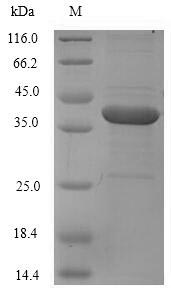Recombinant Human F11 protein offers an exceptional resource for researchers focusing on cardiovascular studies, specifically in the area of blood coagulation. Coagulation factor XI, also known as plasma thromboplastin antecedent (PTA), plays a vital role in the intrinsic pathway of the coagulation cascade, converting factor IX to its activated form, factor IXa.
This product presents a partial sequence of the human F11 protein (19-387aa), which is expressed in E.coli, ensuring the production of a high-quality recombinant protein. The N-terminal 6xHis tag enables seamless purification and detection in a variety of applications. With a purity greater than 90% as determined by SDS-PAGE, our Recombinant Human F11 protein serves as a trustworthy reagent for your cardiovascular research. The lyophilized powder form allows for easy reconstitution and immediate use in your experiments.






